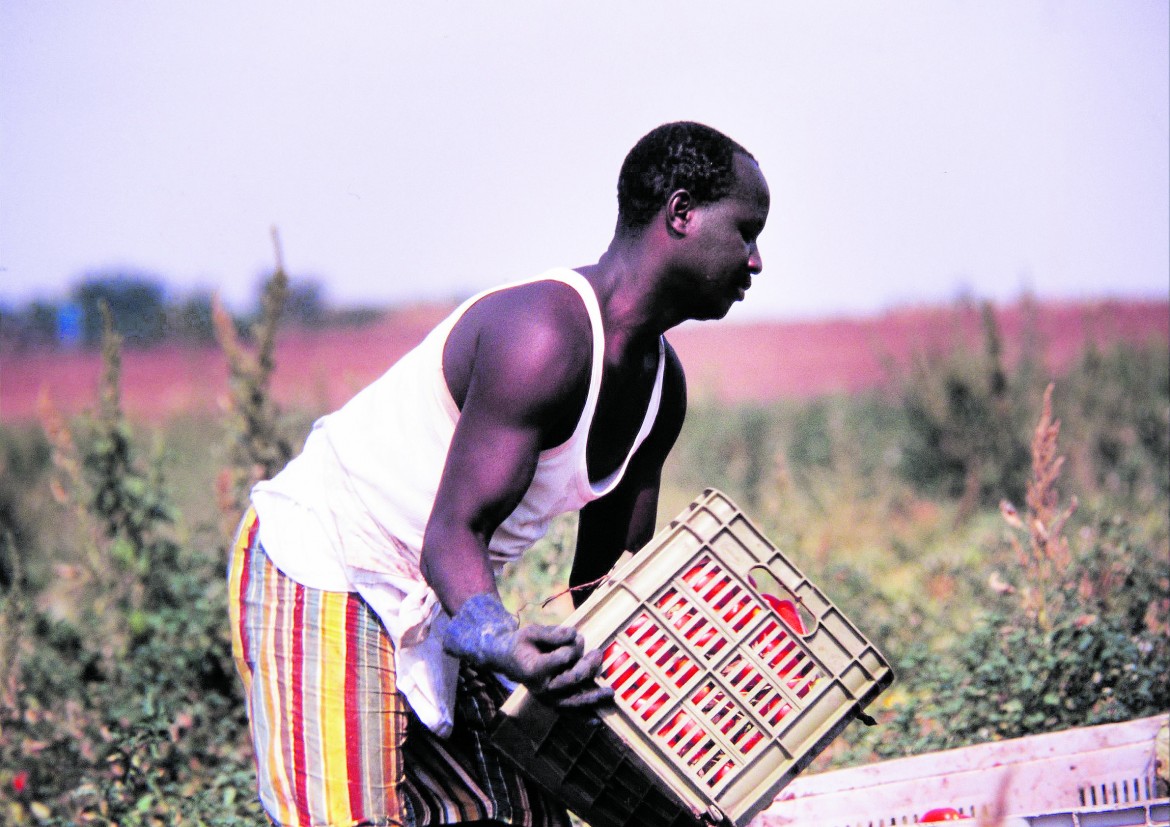Reportage
Let’s regularize Italy’s agriculture workers
'We are acting out of concrete solidarity towards migrants and Italians who work in agriculture and are in great difficulty.'

At Villa Literno, in the province of Caserta, COVID-19 has paralyzed agriculture and forced the migrant community to remain in their dwellings. They are mainly Africans, numbering about 6,000 (although these estimates vary over time): there are the irregular migrants, and then there are around 2,000 who are losing their residence permits thanks to the Security Decree.
They are now left without any work at all, even illegal work, without the possibility to move somewhere else, without help from their families, without health care except for the STP clinic (i.e. for foreigners who are temporarily present) or the emergency room.
On Thursday afternoon, the FLAI CGIL union went to Villa Literno to start distributing food parcels, as National Secretary Giovanni Mininni explained: “We want to reach as many people as possible. We are acting out of concrete solidarity towards migrants and Italians who work in agriculture and are in great difficulty. Even those who have a job now have to deal with the redundancy fund and with the reduction in working days. We have launched an appeal to President Sergio Mattarella and to the government: the situation is tragic in the workers’ ghettos all around Italy, and there is a shortage of labor because the workers are not arriving from the east, stopped by the closing of the borders.
“We can mitigate this with the regularization of illegal workers. Thousands of people could move where they are needed. Without vouchers, which result in work being precarious, but using the traditional forms, such as regular hiring. The collective contract for the sector is already the most flexible compared to the other sectors.”
The proportion of migrants among the workers in the sector is high: “They represent almost 40% of the total agricultural workers in Italy,” Mininni explained. “Overall, the seasonal workers number 1.1 million, and those working on a permanent contract are 100,000. More than 400,000 workers registered with the INPS are foreigners. Then, there are those working informally: about 35% of the total is irregular work, especially involving immigrants.”
According to Coldiretti, there are around 35,000 foreigners who work in Campania from March to November. Around 40% of the fruit and vegetables in Italy, without anyone to pick them, will end up rotting in the fields.
“There are already workers in the country who can revive the sector, but they don’t have legal status and can’t even access health care,” Mininni emphasized. “We should open up regional, interregional and inter-community green corridors for the transit of regular foreign workers, and we should give extraordinary residence permits for work purposes for all irregular foreigners.”
The regularization of the African community is also what the Castel Volturno Solidale network is calling for, made up of organizations such as Caritas, the Fernandes Center, the Comboni missionaries, the CSA Ex-Canapificio in Caserta and the Migrants and Refugees Movement. “They are in the territory, but they don’t have access to residency even though they’re paying rent. They are employed in agriculture, in the buffalo raising industry, in construction and at the beaches, restaurants and pizzerias during summer. They are thousands of local residents, living in an area 27 km in length, large and difficult to manage. So far, there have been 13 cases of positive COVID-19 infections and one death. The virus has only hit the Italians up to now, but people are living with the terror that an outbreak might erupt.”
The network has set up a bank account to accept donations to support the local population (in the name of Caritas di Capua, IBAN IT75C0898774840000000335908, donations must have the mention “COVID-19 Castel Volturno”), and the Pope’s charity arm has already donated €20,000.
Mimma D’Amico of Ex-Canapificio tells us more about the campaign: “We need the regularization of migrants in the territory, as a measure of containment of the contagion and of social disaster. All the income support measures launched by the government, the region and the municipality are failing to reach non-residents, either because they don’t have a rental contract or because they don’t have a residence permit. They aren’t even receiving spending vouchers. They’re calling us because they have run out of gas and aren’t even able to cook.”
They can’t go to work because they are being stopped at the roadblocks, and the authorities are not accepting self-organized transport either: “They have been abandoned,” D’Amico continues. “We need direct support for residents and non-residents, otherwise we will face a social tragedy.”
Originally published at https://ilmanifesto.it/regolarizziamo-i-migranti-per-salvare-lagricoltura/ on 2020-04-17
